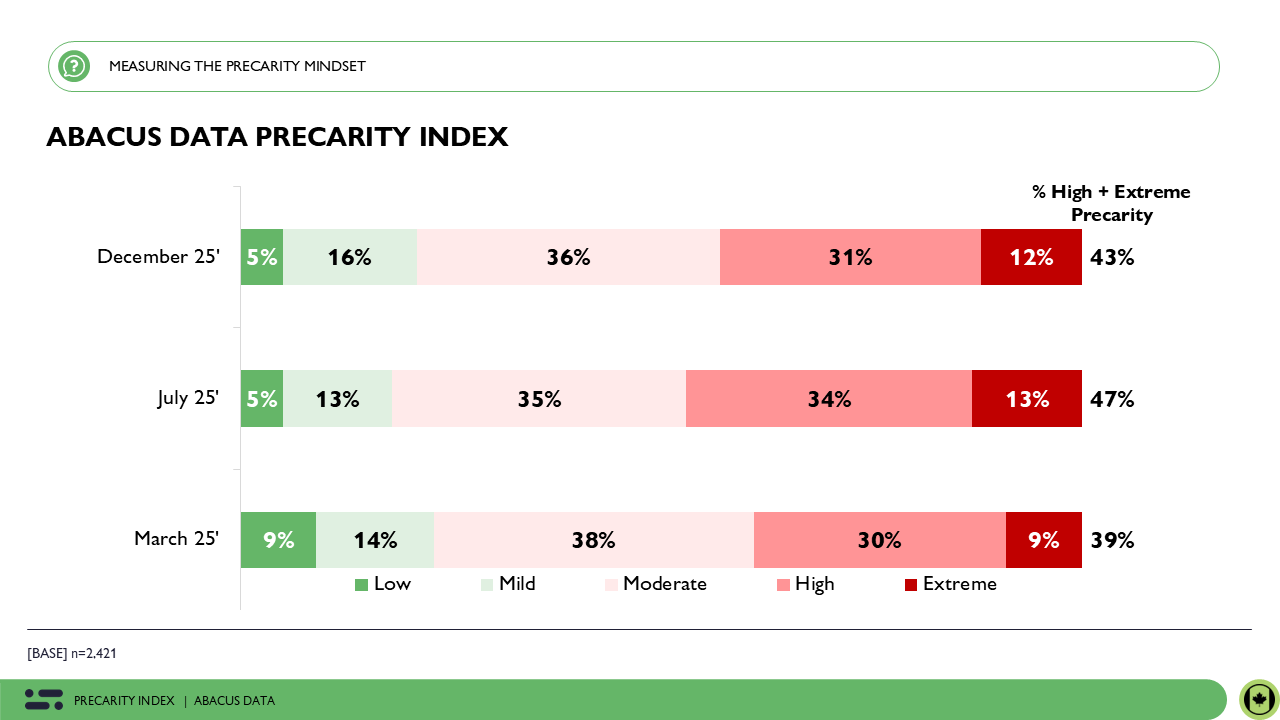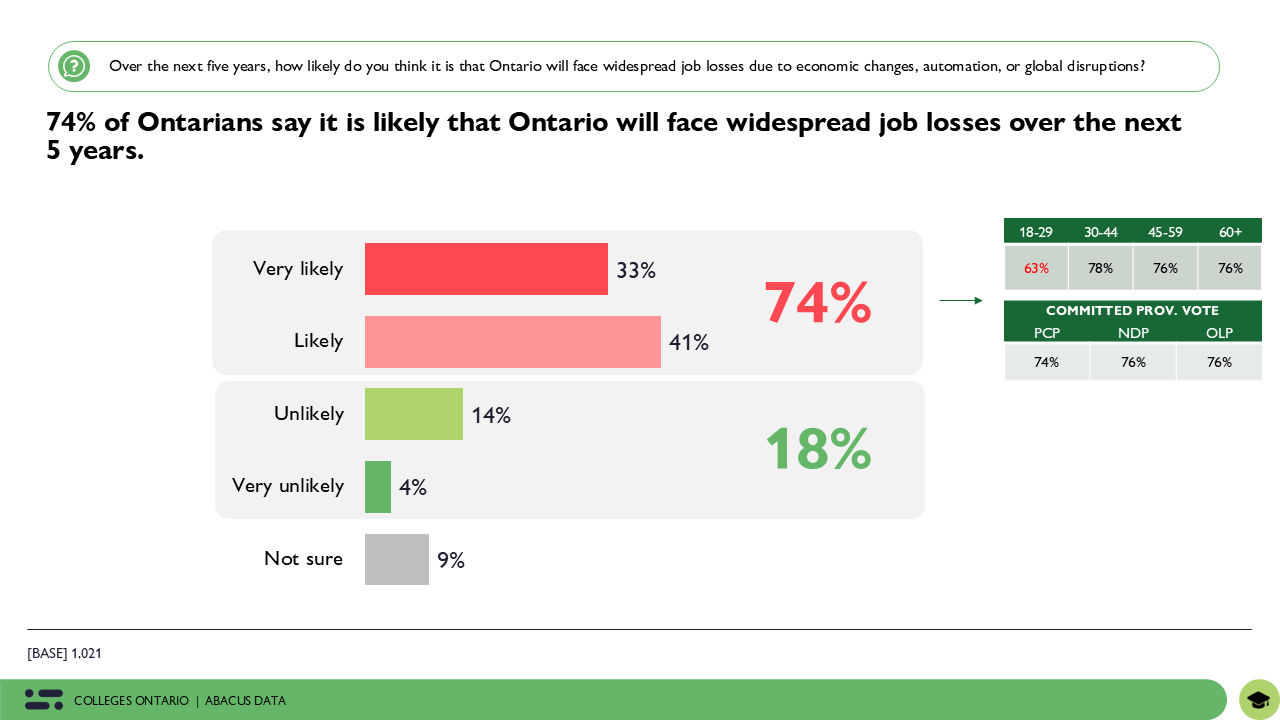What do Canadians believe is slowing down the construction of new housing?
June 6, 2024
Between April 25 and 29 2024, Abacus Data conducted a nationwide survey involving 1,500 Canadians (18+) to assess their perceptions of the housing situation in Canada. The survey explored the perceptions of homeownership, key factors affecting housing affordability, barriers to accelerating construction, and the role and impact of government actions.
The housing landscape in Canada is facing significant challenges, and the current research shows that many Canadians continue to express deep concerns about the attainability and affordability of homeownership. These findings underscore the need for coordinated actions and solutions to instill confidence in the housing market and ensure that homeownership becomes an achievable aspiration for all Canadians.
Perceptions of Homeownership in Canada Today
The current research reveals a negative outlook on Canadians’ perceptions of homeownership today. Specifically, 64% believe homeownership in Canada represents risk and financial strain, especially among non-homeowners (70%). Additionally, 89% of Canadians view housing as unaffordable for most, highlighting the widespread feeling of being priced out of the market. This suggests that many Canadians have lost confidence in the attainability of homeownership.
Furthermore, 81% believe the dream of homeownership is dead and unattainable for most, particularly among renters (85%). These findings underscore the urgent need for action to revive the dream of homeownership and make it attainable for all Canadians, as the dream of homeownership in Canada is currently at risk.

Factors to Consider Regarding Housing Affordability and Perceived Barriers to Speeding Up Construction
With many Canadians losing confidence in the attainability of homeownership, it is important to understand the factors people think are important when considering housing affordability. Among the most important factors to consider with respect to housing affordability, 39% of Canadians cite builders and developers prioritizing profit, while 38% point to increased immigration. Beyond these primary concerns, Canadians also recognize other critical factor that have an impact on construction costs. These include the availability and cost of land (37%), a shortage of skilled trade workers (28%), borrowing costs for builders (27%), provincial regulations (23%), and municipal bylaws (21%). Thus, while many Canadians believe builder and developer profit motives are a significant issue, they also acknowledge the various other factors affect housing costs and the ability to offer affordable housing.

To expedite the construction of new homes and alleviate the housing crisis, it is crucial to understand the perceived barriers. Nearly two-thirds of Canadians (63%) believe high construction costs are the biggest obstacle. Additionally, 46% cite lengthy approval processes and red tape, 41% point to a shortage of skilled labor in the construction industry, and 32% highlight zoning restrictions. These barriers impede the speed of construction and must be addressed to effectively tackle the housing crisis and make affordable housing a reality.
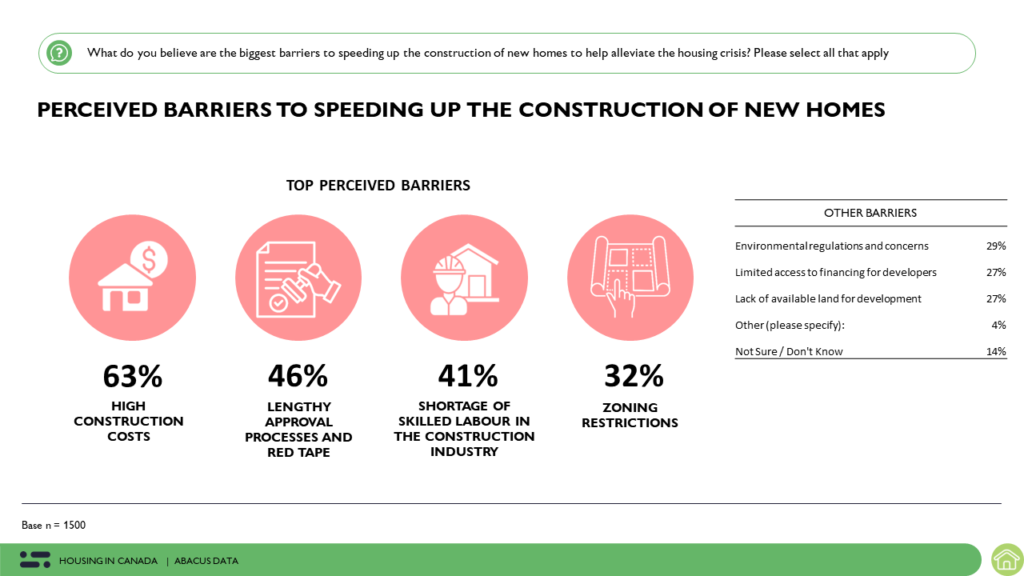
Role and Impact of Government
Degree to which government is doing enough to address housing affordability
Only 1 in 4 Canadians believe the federal government is doing enough to address housing affordability, marking a 10-point improvement since September 2023. Those planning to vote Liberal in the next election are significantly more likely to believe the government is addressing housing affordability (49%) compared to those intending to vote Conservative (11%). Additionally, 26% of Canadians believe their provincial government is doing enough (+12 points since September 2023), and 20% feel their municipal government is taking adequate action (+6 points since September 2023). Despite these improvements, over half of Canadians still believe that all levels of government are not doing enough to address housing issues.
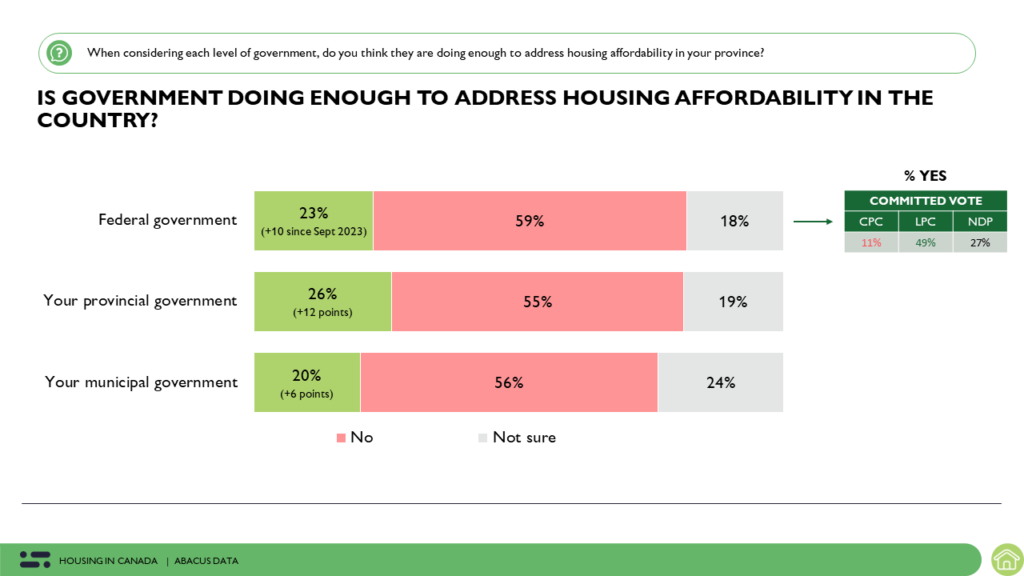
Level of Importance Placed on Making Housing More Affordable
Most Canadians do not believe government, at all levels, are prioritizing housing adequately. Specifically, 63% feel the federal government, 65% their provincial government, and 69% their municipal governments are not giving sufficient importance to housing affordability today. At the federal level, those planning to vote Conservative in the next election are significantly more likely to perceive the government as neglecting housing affordability (71%) compared to Liberal voters (36%). These perceptions highlight a widespread sentiment that housing affordability is not receiving the necessary attention, underscoring the urgent need for more effective government action across all levels.
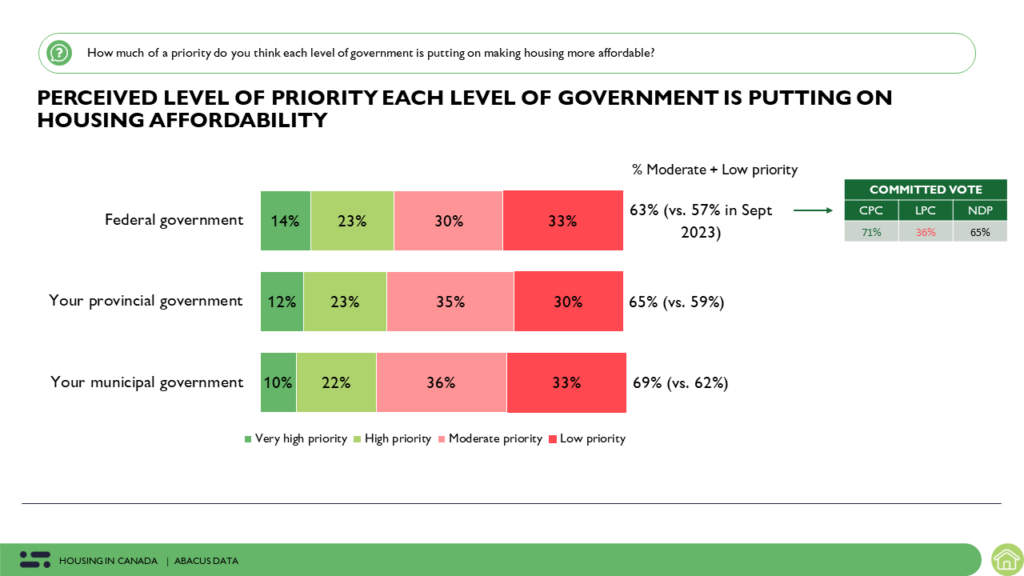
Degree to Which Governments are Working Together
Amidst the prevailing sentiment that all levels of government are falling short in addressing housing affordability and prioritizing its importance, 3 in 5 Canadians (60%) express skepticism about the effective collaboration between provincial and federal governments to tackle the housing crisis, with merely 15% perceiving effective collaboration. Among those doubting this collaboration, 71% intend to vote for the Conservative party in the upcoming election, compared to 44% who plan to vote for the Liberal party. These findings underscore a significant lack of confidence in government cooperation, adding complexity to efforts aimed at addressing the housing crisis and restoring belief in the feasibility of affordable homeownership for Canadians.
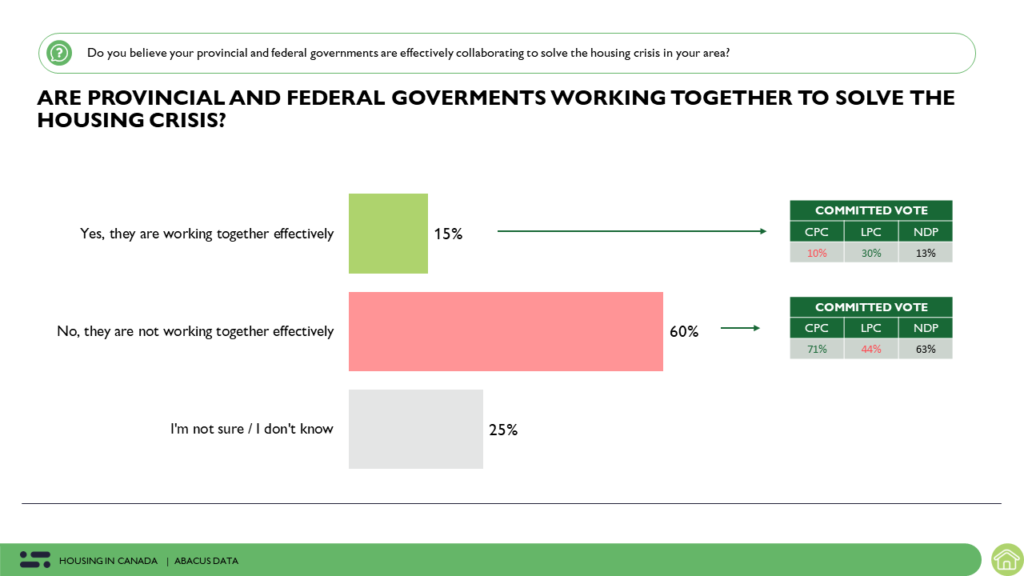
The Upshot
Over the past year, Canada’s housing crisis has reached critical levels, prompting widespread attention from politicians nationwide. Justin Trudeau’s Liberal government has taken significant strides towards addressing housing accessibility and affordability, notably through measures outlined in the 2024 Federal Budget. However, despite these efforts and some signs of a shift in sentiment, there remains a prevailing sense of dissatisfaction among Canadians regarding the government’s response. Many believe that the federal government is failing to adequately address housing affordability, prioritize it effectively, and collaborate efficiently with provincial counterparts on this issue. Consequently, pessimism persists among Canadians regarding the future of housing accessibility and affordability in the country, with a strong belief that the dream of homeownership in Canada is dead and unattainable.
This pessimistic sentiment surrounding the state of housing in Canada adds an intriguing dimension to the current political landscape. While Justin Trudeau and the Liberal government strive to demonstrate their commitment to addressing housing concerns, Pierre Poilievre has actively championed housing affordability as a central focus of his political agenda, consistently emphasizing this message. As the discourse on housing continues, navigating these differing approaches will be crucial in addressing the pressing needs of Canadians and shaping the future trajectory of the housing market.
Methodology
The survey was conducted with 1,500 Canadian adults from April 25 and 29 2024. A random sample of panelists were invited to complete the survey from a set of partner panels based on the Lucid exchange platform. These partners are typically double opt-in survey panels, blended to manage out potential skews in the data from a single source.
The margin of error for a comparable probability-based random sample of the same size is +/- 2.53%, 19 times out of 20.
The data were weighted according to census data to ensure that the sample matched Canada’s population according to age, gender, educational attainment, and region.
This survey was paid for by Abacus Data Inc.
Abacus Data follows the CRIC Public Opinion Research Standards and Disclosure Requirements that can be found here: https://canadianresearchinsightscouncil.ca/standards/
ABOUT ABACUS DATA
We are Canada’s most sought-after, influential, and impactful polling and market research firm. We are hired by many of North America’s most respected and influential brands and organizations.
We use the latest technology, sound science, and deep experience to generate top-flight research-based advice to our clients. We offer global research capacity with a strong focus on customer service, attention to detail, and exceptional value.
And we are growing throughout all parts of Canada and the United States and have capacity for new clients who want high quality research insights with enlightened hospitality.
Our record speaks for itself: we were one of the most accurate pollsters conducting research during the 2021 Canadian election following up on our outstanding record in the 2019, 2015, and 2011 federal elections.
Contact us with any questions.
Find out more about how we can help your organization by downloading our corporate profile and service offering.


